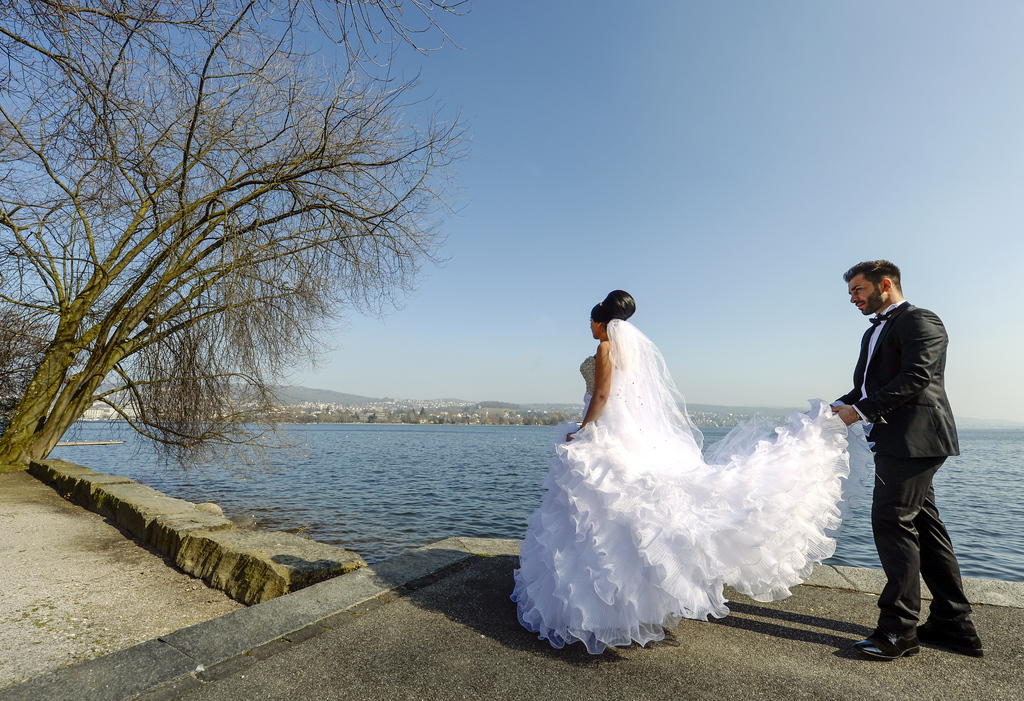Tying the knot – Swiss style

Almost half of the 40,000 weddings which take place in Switzerland every year are held between June and September. During these four months, castles, mansions, and lakeside restaurants from Geneva to St Gallen do a roaring trade, as do owners of antique cars and horse-drawn carriages, who cart the newlyweds from party to party.
Unlike most people, the Swiss hold their weddings after they are already man and wife, since they are required by law to marry at a registry office before exchanging vows in a church.
Once they have the proper documents, the newlyweds are free to hold a ceremony anywhere they choose, and many bypass their local church in favor of a castle courtyard or alpine chapel. But finding clergy willing to perform weddings outside their own parishes is not easy.
“Freelance” theologian
American minister Arthur Bowler, who works part-time for a parish near Zürich, is a “freelance” theologian who can be hired to perform ceremonies in all kinds of unlikely places.
“I have married couples on ships, in hotels, on mountaintops, even in a greenhouse,” he says. “Some people want a church wedding but still request a ceremony without a single religious element. I’m willing to do that, too.”
Brigitta Kammer and her fiancé, who plan to marry this summer, have decided that a registry-office ceremony is all they want. “I don’t want to promise things in church that aren’t meaningful to me,” Kammer explains.
Kammer spent time searching for a registrar who would let the couple contribute their own words to the standard ten-minute civil ceremony. She has settled on the town of Murten “because the woman who does the ceremony there is open to our ideas and willing to take her time”.
Church weddings
Although an increasing number of brides are content, like Kammer, with a civil ceremony followed by a party, church weddings are still popular among the Swiss, even though many are not regular churchgoers.
The traditional Swiss wedding consists of an early-afternoon church ceremony followed by an apéritif for 100-150 people served nearby. Later there is an elegant dinner for around 50 close friends and family members, often in a different town or even canton.
In most countries, this programme would be elaborate enough, but a wedding in Switzerland isn’t complete without amateur entertainment. Guests organise games, write poems and songs, perform skits, play musical instruments, and create elaborate gifts, all honouring-or poking fun at-the bride and groom.
The job of coordinating these productions traditionally falls to the best man and maid-of-honour, who often set up a detailed program of fun-and-games to fill the time between the afternoon’s apéritif and the dinner several hours later.
Surprise weddings
Angie Bader, for example, has planned only the bare bones of her wedding: the civil ceremony at 1100., the drinks at noon, the dinner at 1800. She and her fiancé have asked their attendants to make the rest of the day a surprise.
“We explained what we could afford to spend and then left it up to them,” Bader says. “All we told them was ‘No parachuting or balloon rides!'”
Best man Bruno Stucker received a similar request when his friend Christoph got married. Together with the maid-of-honour, Stucker was in charge of coordinating the amateur performances, organising a joint gift from the dinner guests, putting together a funny slide show about the couple, setting up special transportation from the apéritif to the dinner, and hiring musicians. As a final touch, sparklers tied to helium balloons were released by the guests as they left for home.
Increasingly, brides and grooms are giving their friends a break and asking professional wedding planners like Vivane Duffy to do all this work. Duffy considers it her job to make sure that the wedding conforms to her clients’ dreams.
“Couples still plan an hour or two between dinner and dessert when their guests can entertain them,” says Duffy. “But I work with the best man and help him steer people away from productions that could be boring or embarrassing.”
Kidnapping the bride
Janine Schmidt, a well-known wedding coordinator, discourages her clients from permitting too much amateur entertainment, especially silly traditional games like kidnapping the bride and then forcing the groom to find her or making him chop wood while she knits a scarf.
“Most Swiss today are around 30 when they marry. That’s simply too old for some of these traditional jokes,” she says.
One tradition that nevertheless remains very popular is “Spalierstehen” or “faire la Haie”. When the newly married couple emerges from the church or registry office, they “walk the gauntlet” between two rows of work colleagues, teammates, fellow choristers, friends from the Scouts – the list is of possibilities is endless – all in matching outfits.
Monika Räss, for example, has stood many times with a group of her fellow dental hygienists outside a church door, wearing her white coat and waiting for a friend from work to walk out with her new husband, so that the couple can be saluted with raised toothbrushes or mammoth tubes of toothpaste.
“And don’t forget about ‘decorating’ the apartment,” says Räss. “We know a couple who came home from their wedding party to find that their front door had been completely bricked up, and they had to use a pickaxe to get inside.”
Clearly, old traditions diehard. No matter how elegant the setting, wedding guests in Switzerland continue to enjoy teasing their newly wedded friends.
by Kim Hays

In compliance with the JTI standards
More: SWI swissinfo.ch certified by the Journalism Trust Initiative







You can find an overview of ongoing debates with our journalists here . Please join us!
If you want to start a conversation about a topic raised in this article or want to report factual errors, email us at english@swissinfo.ch.